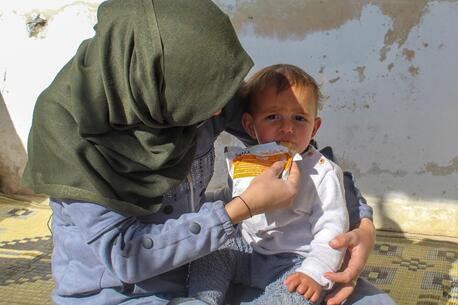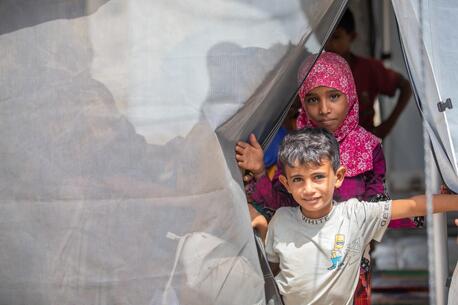
After 100 Days of Heavy Fighting, Sudan's Children Hardest Hit
Armed conflict that began in the streets of Khartoum on April 15, 2023, has torn Sudan to pieces, leaving close to 14 million children — one out of every two — in dire need of humanitarian aid. Their artwork is stark proof that children are witnessing things no child should ever see. UNICEF is helping them get their childhoods back.
Making art helps children caught up in Sudan's ongoing crisis start to heal from the impacts of war
“No bullets. One rose for each child.”
These were the powerful words of 10-year-old Majd during a psychosocial support session organized by UNICEF and partners for children struggling with the impact of life in a war zone.
It is now 100 days since full-scale armed warfare erupted in Sudan on April 15, 2023, disrupting basic services and pushing children and their families out of their homes. Majd is one of them.

Providing psychosocial support to improve children's mental health and well-being is a critical part of UNICEF's mission in Sudan
While they continue to find new homes, friends and ways to cope with the new normal, many children live with scars from the horrendous experiences. Without immediate and specialized support, the impact will have a long-term effect on their well-being and development.
Providing psychosocial support and catering to children's mental health remains a critical part of UNICEF’s emergency response in Sudan. This will not only strengthen their resilience to help them recover from toxic stress and trauma but also help them to regain their childhood.

Creative activities help children express their feelings
In the early hours of the morning, at a gathering point in east-central Sudan that hosts more than 3,000 displaced persons, most of them women and children, kids engage in creative play with support from UNICEF and partners.
Through colorful drawings, they express their feelings on the conflict and how it has impacted their lives. The fun activity brings together both the younger and older children. Using markers to better communicate their stories, most of the children participate. The smaller ones scribble, the older ones draw eerily accurate military vehicles and scenes of war.
I have my daughter ... She has been so quiet ... She suffered trauma following what we endured, including the constant shooting back home. — mother of Majd, 10
The mothers watch from a distance while asking facilitators to encourage their children to speak up and share their feelings. They know it is part of the healing journey.
“I have my daughter. She can draw well," Majd's mother said. "She has been so quiet. She needs to communicate and socialize with people. She suffered trauma following what we endured, including the constant shooting back home.”
A child's view of life in a combat zone
Majd doesn’t say much. She continues to suffer from flashbacks after surviving an armed attack that killed two of her closest friends, Sarah and Israr.
“They were waiting by the gate for the car to take them out of Khartoum when a shell fell nearby, and the fragments went into their bodies," she recalled. "They both died on the way, they couldn’t find an emergency ward.”
While Majd appeared sad, she smiled shyly when she saw the colorful markers and paper. Without thinking twice, she quickly picked up a marker and started drawing. On her paper a figure appeared, wearing a militia fighter's beret, brandishing a rifle, its barrel filled by the stem of a beautiful flower.
Later, she would explain what her drawing meant: “No bullets. One rose for each child ... This painting is for every child affected by the war."

I wish the war would stop. I want to go home. — Fatima
Fatima drew a military tank. “Because of the war," she explained. "I saw the military tank and soldiers while on the road to another city. There was fighting. At home, I heard gunshots and bombs."
Originally from Khartoum, Fatima and her family have fled conflict twice, leaving behind everything – first from Khartoum and later Kosti. They are now settled in Madani, which she says is much calmer.
“I miss my friends Omnia, Fatuma and Farida, my toys and dolls," she said. "I wish the war would stop. I want to go home."

During the journey, we saw dead bodies... — Ahmed
One night while Ahmed slept soundly, his dreams were suddenly interrupted by gunfire. That day signified the start of the conflict in his hometown. “We woke up to the sound of gunshots, then we watched it on the news,” he said.
When the situation deteriorated, Ahmed and his family were left with no option but to leave. “We gathered our belongings and went to the street to find buses," Ahmed said. "The bus brought us here.
“During the journey, we saw dead bodies, and the stench was so bad that it stayed in the bus until we arrived."
“They killed my uncle,” added Qasim, working on his drawing nearby.

Behind every child affected by conflict in Sudan is a voice and a powerful drawing. The experiences they have endured cause stress and trauma. Activities as simple as coloring and drawing help them heal and cope. Through simple conversations and sharing of experiences, they are taken through the healing process — one day at a time.
UNICEF and partners continue promoting mental health and psychosocial support by providing community-led services adapted to local contexts and implemented with the active participation of affected children, their caregivers and families.
Today, 10-year-old Majd wishes for peace to return to Khartoum and for the conflict to end so that she could reunite with her family in their home. “I miss my cat and books,” she said. “I also hope that every child that was affected by this war comes back stronger.”
Help UNICEF reach children caught in conflict with lifesaving support and protection. Please donate.
HOW TO HELP
There are many ways to make a difference
War, famine, poverty, natural disasters — threats to the world's children keep coming. But UNICEF won't stop working to keep children healthy and safe.
UNICEF works in over 190 countries and territories — more places than any other children's organization. UNICEF has the world's largest humanitarian warehouse and, when disaster strikes, can get supplies almost anywhere within 72 hours. Constantly innovating, always advocating for a better world for children, UNICEF works to ensure that every child can grow up healthy, educated, protected and respected.
Would you like to help give all children the opportunity to reach their full potential? There are many ways to get involved.





